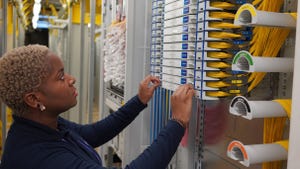
Dish Network's Charlie Ergen took the stand this week during the antitrust trial against the proposed merger of Sprint and T-Mobile, and he didn't miss his opportunity to drop some bombshells.
According to reports from the trial, he showed letters from Morgan Stanley, JP Morgan and Deutsche Bank dated December 9 that said each respective bank was "highly confident" it could lend Dish $10 billion for the construction of its promised 5G network.
Ergen has previously said that it will cost around $10 billion for Dish to build the nationwide 5G network it promised the Department of Justice it would build if the merger between Sprint and T-Mobile is approved. However, analysts continue to believe it will cost Dish even more, considering AT&T and Verizon spend roughly twice that amount every year on their overall telecom networks.
Underscoring Ergen's testimony this week were the results from Dish's recent stock offering. As noted by The Wall Street Journal, Ergen's family invested about $600 million in Dish's recent $1 billion stock offering designed to raise money for the company's wireless network.
But all those billions of dollars weren't the most interesting courtroom shocker to come from Ergen's testimony. According to multiple reports from the proceeding, it appears that Dish has managed to sign up unnamed "strategic partners" for 5G since Ergen's deposition for the trial. Indeed, a discussion between the judge and lawyers in the proceeding about that development occurred behind closed doors, presumably because the partnerships haven't been announced publicly yet.
According to Wall Street analysts at New Street Research, an attorney for Deutsche Telekom representing T-Mobile at the trial told the judge that he "ought to be aware of some of the discussions they're [Dish] having with very exciting, very exciting potential strategic partners to work with them and to develop this product in a way that becomes a real serious competitive threat." The analysts reported that Dish's lawyer described the potential partners as "some of the most successful companies on the planet."
Concluded the analysts in a note to investors: "We, of course, cannot know, but we can guess who they are talking about. We also cannot know, nor can we guess what it means to be having 'discussions.' "
Rumors surfaced in 2017 that Dish was in discussions with Amazon about a potential wireless partnership, but during testimony last week DT's Timotheus Höttges testified that those rumors were "another one of Charlie Ergen's stupid bluffs."
It's also important to note that Verizon inked a major 5G and edge computing agreement with Amazon just this month, a move that essentially stands as a counter to similar efforts between AT&T and Microsoft.
Still, it's worth reiterating that the identities and details of Dish's new "strategic partners" were not revealed during the public proceedings of the ongoing trial.
A turning point?
The ongoing trial between Sprint and T-Mobile and a group of state attorneys general is unique for a number of reasons. Not only will the result of the trial upend the US wireless industry -- regardless of the outcome -- it also promises to potentially change the way major mergers and acquisitions move through the US government's approval process. If the states are successful in their litigation against the merger, it could alter the nation's overall antitrust process by creating yet another obstacle for potential deals beyond the Department of Justice. But if Sprint and T-Mobile successfully merge, it could create a precedent that other companies will likely use to stretch the boundaries for permissible deals.
In the ongoing case itself, Ergen's testimony has been viewed as a major turning point considering the companies' merger argument largely hinges on whether the judge views Dish as a suitable replacement for Sprint as a fourth nationwide wireless network operator in the US.
In his testimony, Ergen argued that he is indeed serious about building a nationwide 5G network. "It would be financial suicide [not to build the network], and we're not suicidal," he testified, according to the WSJ. Ergen explained that Dish faces $2 billion in penalties if it doesn't put its vast spectrum holdings to use.
"Ergen... paints the picture of a credible witness who simply says what he believes, with little coaching or help from attorneys in preparing his testimony," noted the analysts from New Street.
Although Ergen repeated many of the points Dish has previously disclosed about its 5G plans, he also testified that Dish has already built 750 of the 1,000 sites it needed for its previously planned NB-IoT network. He said the company hopes to build 10,000 cell sites for its 5G network by the end of 2022.
He also said that Dish will launch an MVNO on T-Mobile's network within a month after the closing of the Sprint/T-Mobile merger, and that it would offer wireless service at prices lower than what most wireless providers charge today.
That's due to the MVNO agreement that Dish obtained from T-Mobile as part of T-Mobile's agreement with the US Department of Justice. Ergen said he initially negotiated a deal with T-Mobile for access to 12.5% of T-Mobile's network capacity under an MVNO deal, but that DoJ negotiators were able to raise that to completely unlimited usage. This, Ergen testified, indicated that the DOJ's people "were better negotiators than we were," according to Cnet.
Plenty of twists and turns
Ergen wasn't the only source of fireworks during the trial. According to a report from the NY Post, a reporter with Fox Business tasked with covering the trial for the network was barred from entering the courtroom after officials discovered he was carrying a glass crack pipe. He was reportedly escorted from the premises without incident, and received a violation for possessing drug paraphernalia on federal property.
Inside the courtroom things were equally exciting. Officials from Sprint reportedly testified about the troubles that Sprint continues to face in the US wireless industry, which underscores the company's argument that it cannot effectively compete outside of a merger with T-Mobile.
But according to reports, the judge repeatedly pressed former Sprint CEO Marcelo Claure why he wasn't able to turn Sprint around like John Legere did with T-Mobile. "I have spent countless nights understanding what T-Mobile had done and why we couldn't do the same. It all comes back to one basic thing that is called 'spectrum,' " he responded, according to the analysts from New Street.
However, the New Street analysts said that documents submitted by the state attorneys general undercut Claure's testimony. Specifically, they cited documents suggesting SoftBank could provide more financial support for Sprint. "These documents landed some blows but did not, in our view, provide a knock-out punch for Sprint's preferred narrative," noted the analysts from New Street.
— Mike Dano, Editorial Director, 5G & Mobile Strategies, Light Reading | @mikeddano
About the Author(s)
You May Also Like




.jpg?width=300&auto=webp&quality=80&disable=upscale)







